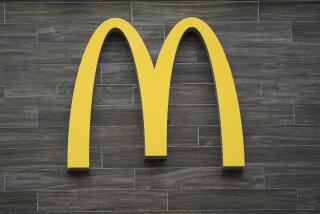Side Order of Real Estate : McDonald’s Opens an Office Tower to Help It Turn a Profit in Moscow
- Share via
MOSCOW — McDonald’s expanded its business here beyond Big Macs into real estate Tuesday, opening a sleek, downtown office tower that houses the second of the fast-food chain’s restaurants in Russia.
Hundreds of hungry Muscovites lined up to sample the famed fare and to gawk at the black, glass and chrome building, rising 12 stories above Moscow’s Ogareva Street, just two blocks from the Kremlin.
The opening of the McDonald’s tower marks a major advance in the company’s strategy for turning a profit in the former Soviet Union.
McDonald’s serves burgers and fries to almost 50,000 people daily in its restaurant on Pushkin Square, half a mile north of the newest outlet. Despite that volume, the company earns little profit from food sales because prices are low. A Beeg Mak in Moscow, for example, is the cheapest in the world at 1,100 rubles, or just slightly more than $1, compared to almost $2 in Los Angeles. Food and drink at the Russian outlets are sold for rubles only.
To best employ the billions of rubles that pour in daily--and whose worth is devoured by inflation--McDonald’s branched out into real estate. Dollar rents from office space in the tower, badly needed by foreign businesses working in Russia, will let McDonald’s turn an overall profit in Moscow, even if selling burgers doesn’t earn the chain much.
“One of the ways we’re going to make a profit is this building,” said George A. Cohon, senior chairman of McDonald’s Restaurants of Canada and the man who has spearheaded the chain’s entry into the Russian market. “How can you make profit on one restaurant or two restaurants?”
Corporate giants such as Coca-Cola, Toyota and American Express have already moved into the $15-million McDonald’s tower, built with heavy emphasis on locally supplied labor and materials. No one is saying exactly how much it costs to lease space in the building, owned jointly by McDonald’s and the Moscow City Council.
“Relative to modern office accommodations in Moscow, it’s very competitive,” said Brian Ellis, general manager for Upjohn, the Michigan-based pharmaceutical maker renting the tower’s seventh floor.
The tower’s opening is McDonald’s answer to critics who predicted that the company could not operate in Russia at Western standards.
“There’s a lot of negative stuff that comes out of this country. There are all sorts of levels of pessimism,” Cohon said. “I’m one person who’s here to say: ‘Forget about it. Things can be done here.’ McDonald’s experience is a good and healthy experience.”
He recalled that conventional wisdom said McDonald’s could not make its initial deal with grim Soviet authorities. True, it took 14 years to negotiate the opening of a McDonald’s in Moscow. But with its second outlet open, the company is plunging ahead with plans to open its third Moscow restaurant, on the famed Arbat pedestrian mall, in July.
“People said you’d never be able to get food products or supplies,” Cohon said. But he noted that 98% of ingredients now come from Russian sources. Much of the meat, potatoes and other ingredients come from local farms and are prepared in the $45-million, state of the art food-processing “McComplex” in the Moscow suburbs. Standards are so high that 40 quality control checks are reportedly made on every piece of meat.
Thanks to the blossoming of new businesses here, McDonald’s can also buy quality products--such as pickles and minced onions--from Russian firms at lower cost than it can prepare them itself.
McDonald’s--which also earns hard currency here by selling milk and bread in Moscow grocery stores and by exporting goods purchased for rubles for resale in the West--keeps its Russian menu simpler than the one in the United States. It sells little more than burgers, fries, drinks and dessert.
And though McDonald’s tries to cut costs and keep prices low, even a simple lunch is out of reach for many Russian diners. A hamburger, fries and a milkshake cost 1,000 rubles (90 cents at current exchange rates). That’s a big bite for Russians, whose monthly salaries average 25,000 rubles ($24).
Still, “I love McDonald’s. I’ve taken my whole family to the other McDonald’s several times,” said Tatiana Bogdanovich, a retired high school teacher enticed to the opening by free sodas offered Tuesday.
“But now,” she said, “it’s gotten so expensive that I only come for my grandson’s birthday.”
More to Read
Inside the business of entertainment
The Wide Shot brings you news, analysis and insights on everything from streaming wars to production — and what it all means for the future.
You may occasionally receive promotional content from the Los Angeles Times.










